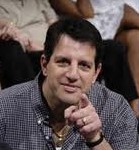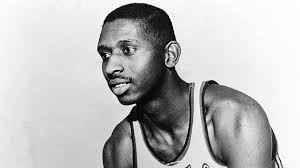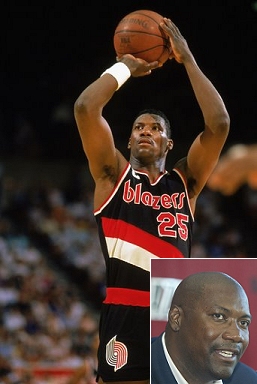 The NBA lost one its pioneers with the death of Earl Lloyd. As a former teammate of my dad, Dolph Schayes, I had the pleasure of speaking with Earl on many occasions. He was a man of tremendous grace who seemed timeless. A quiet man never without a smile, Earl was a tremendous presence in any company.
The NBA lost one its pioneers with the death of Earl Lloyd. As a former teammate of my dad, Dolph Schayes, I had the pleasure of speaking with Earl on many occasions. He was a man of tremendous grace who seemed timeless. A quiet man never without a smile, Earl was a tremendous presence in any company.
 Earlier this year I said goodbye to another pioneer that I’ve known forever.
Earlier this year I said goodbye to another pioneer that I’ve known forever.
In the 1980s my Denver Nugget teammate Kiki Vandeweghe and I were part of a small group of players whose dads had been NBA players. Kiki and I had been friends since high school and each of us has an only child born after we turned 40. We have boys born a week apart who are the only ones in that generation to carry on the family name. His dad, Ernie, left us a few months ago. Kiki told me that it is a crappy club to belong to.
When my son Logan entered 3rd grade a few years ago, he made friends with a boy in his class and wanted to play after school. It turns out that the friend’s grandpa was Vern Mikkelsen. What are the odds that two NBA pioneer stars from Syracuse and Minneapolis would have grandsons that happen to become friends in an elementary school in Phoenix, Arizona? My dad and Vern got to speak on the phone for the first time in years. We lost Vern last year.
Each of these men were close to me in a unique way. They will be missed. And as sad as their passings are, I can appreciate that they lived full lives, impacted generations, and made a difference. They are folks to celebrate, tell stories about, and honor.
The league’s pioneers are over 80 years old now, and their numbers are shrinking. My dad is now the oldest living Top 50 player, at 86 being a few months older than Bob Cousy.
 Last week we also lost a friend that hit much closer to home. Jerome Kersey was a young man who died of a blood clot at 52. He was active with the Trail Blazers and full of life. At 55, I am seeing friends, former teammates, and competitors die from “natural causes”.
Last week we also lost a friend that hit much closer to home. Jerome Kersey was a young man who died of a blood clot at 52. He was active with the Trail Blazers and full of life. At 55, I am seeing friends, former teammates, and competitors die from “natural causes”.
We lost Wayman Tisdale to cancer, Dennis Johnson to a heart attack, Maurice Lucas to cancer, and now Anthony Mason to complications from a heart attack, all in their 40s and 50s. Way too young. They were just getting started.
What separates these players from the really young guys who die, like my former teammates Bobby Phills and Malik Sealy? Those deaths are tragedies of the highest order but happened in accidents. We are left to wonder what might have been. Their deaths are shocks to the system. We are left in disbelief asking “what if?” They were great folks who touched us for a brief time and are forever young. We feel bad for them and their families. But we aren’t them.
But as my generation passes 50, I read too many names in the headlines. Each year at the All Star Legends Brunch, the “In Memorium” section has more and more pictures in color. These aren’t car accidents, plane crashes, or guys who fell off a cliff. It could have been me. After all I feel young, even though I’ve got some grey hairs and some wrinkles. I feel vibrant even with my belly and sore ankle. In my mind I can still run the court and play. But guys my age aren’t dying in ways that I can believe won’t happen to me. Nor are they guys who have lived to be 100 and have grandkids in college.
We have young kids in middle school, in little league, going on field trips. We aren’t empty nesters being put out to pasture. We are in our prime. Granted it’s the workingman’s prime, not the athletes prime. But it’s our prime nonetheless. We are moving and shaking, and I don’t mean our butts. We are being survived by our parents.
As athletes we start real life later than most. By the time we leave the game and enter the real world, our college counterparts have been in the workforce for a decade or more. That fact only exaggerates our feeling of youngness. At 45 we are just getting some momentum. 50 is the new 35. So when I see a contemporary keel over on the treadmill, playing ball, or walking down the street it doesn’t seem very “natural” to me. But reality is what it is. It could be me.
So the message today is not one of depression and sadness. Nor is it one of anxiety. It’s not National Buzz Kill Day.
The takeaway is appreciation. I talk to my parents often discussing their ailments, noticing the slowing movements and the occasional hunt for the right word. And I am thankful for each conversation and opportunity to tell them that I love them.
My wife and I sit at baseball games watching a bunch of 12 year olds kick the ball around and enjoy the smile on my son’s face when he drives one to the opposite field.
I am reminded daily that this is the only body that I will ever receive so take my vitamins, exercise more and lose the damn weight already. I am thankful that my parents are still kicking and I have their genes.
And most of all, love them all the best that you can. When they (or you) are gone, it is too late. As Kiki said, it’s a crappy club to be in.
Danny Schayes is a Director of Business Optimization at Intensity and a leader in the business of professional sports. Schayes frequently advises sports organizations in complex business matters that include contract negotiations, pricing strategy, marketing optimization, and executive leadership. Follow him on Twitter.
THanks, Danny –
As a young man I got to see the Nats play in New York in late, 1955, so that I saw Dolph and Earl and the rest of that fine, defending NBA championship team. As I recall, Dolph was from NYU and took a lot of set shots. NYU, of course, no longer has a basketball team, which seems incredulous, and the set shot went out with the dinosaur, so it seems. Anyway, those are wonderful memories and I can still smell the cigar smoke in the Old Garden.